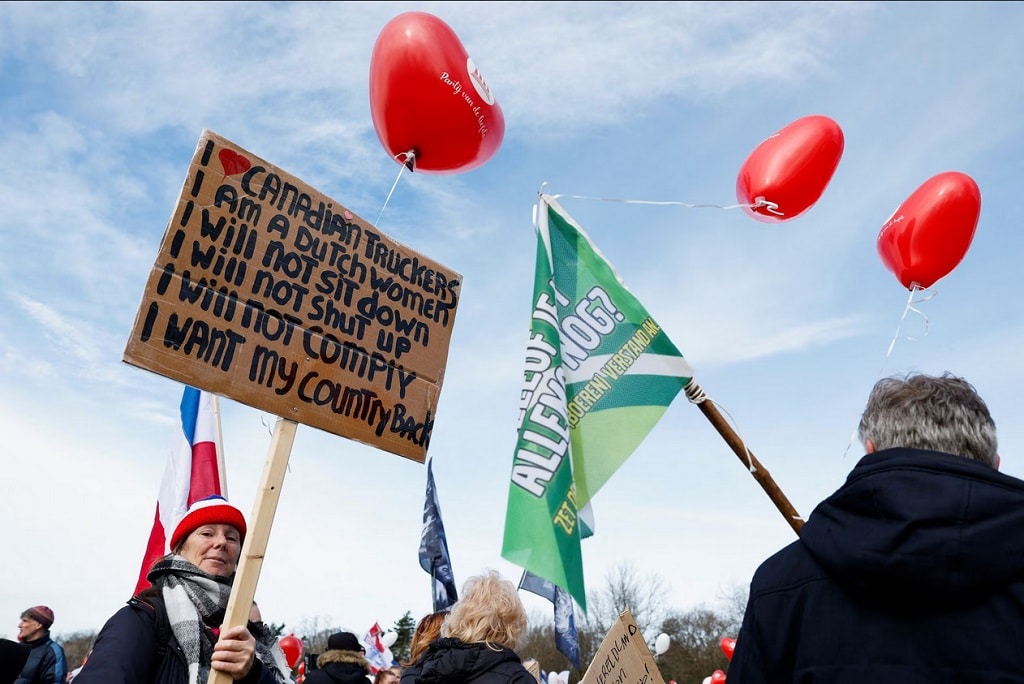News
Dutch and Canadian Farmers Fight Against Absurd Climate Policies

Thousands of farmers demonstrated in The Hague on Saturday against government plans to limit nitrogen emissions, which they say will put many farms out of business and harm food production.
During the demonstration, many people held the national flag upside down as a symbol of the upcoming March 15 regional elections, which followed similar protests by farmers in Belgium earlier this month over nitrogen emission rules.
Thousands of environmentalists also blocked a major thoroughfare in an unauthorized protest against tax rules encouraging fossil fuel use. Late in the afternoon, police used water cannons to disperse a group of about 100 activists.
The pro-farm protesters carried banners reading “No farmers, no food” and “There is no nitrogen ‘problem'” during the peaceful demonstration organized by the Farmers’ Defence Force group.
Because of the relatively large number of livestock and the heavy use of fertilizers, nitrogen oxide levels in the soil and water in the Netherlands and Belgium are higher than European Union regulations allow.
Farm organizations claim that the problem has been exaggerated and that the proposed solutions are unfair and ineffective.
Next week’s regional elections are significant because they will determine the composition of the Dutch Senate and because regional governments are in charge of translating national government goals, such as nitrogen caps, into concrete plans.
Environmentalists led by the climate activist group Extinction Rebellion scaled a wall next to the road they had blocked to hang a banner reading “Stop fossil subsidies”.
Reuters reports protesters are calling for an end to fuel tax exemptions for oil refineries and coal plants and exemptions for the aviation and shipping industries agreed upon at the EU level.
Farmers hammered by Trudeau’s climate alarmist policies
Meanwhile, while farm groups are “making nice” with the federal government on climate change policies, some outspoken academics and scientists argue that Canadian agriculture will suffer.
Ross McKitrick, an environmental economics professor at the University of Guelph, is one of the most vocal critics of the federal government’s “destructive agenda of removing fertilizer use.”
The federal government has called for net-zero production of some greenhouse gas emissions (excluding the most common: water vapor) by 2050 and has recast agricultural scientists’ roles to prioritize climate change.
“I believe it is completely inappropriate for Agriculture Canada to shift its focus away from assisting farmers in increasing productivity,” McKitrick said. “We already have controls on nitrogen emissions, and most conservation areas have long been working with farmers with nutrient flows into rivers, so it’s not like this work wasn’t happening.
But this new push to eliminate fertilizer use is frightening, as is the lack of analysis, which is typical of the federal government right now.”
He noted that previous administrations had all collaborated with independent modeling groups within the government to determine the effects of policy and economic analysts outside the government. “And now it’s all gone. “None of that happens anymore,” he lamented.
“I’ve heard this over and over again in a variety of policy settings. The government is simply winging it. They are motivated by ideology and do not consider the costs of these policies.
They will not release any results as long as people in the government are still doing them. There is nothing in the regulatory impact analysis statements that are issued. They are empty assertions that this will cause no harm and that they will impose policies” that disproportionately harm agriculture.
He warned farm groups to bolster their message and push back, or they would be burned.
“If they believe that making nice with the government over the net-zero agenda will make them friends with environmental groups or get the government to leave them alone, they are sadly mistaken,” he said.
“Canada’s energy sector did that for years. They stated that they fully support your climate agenda. ‘We’d rather be at the table than the meal on the table,’ they used to say, and guess what happened? If you endorse the government’s alarmist rhetoric and agenda, they will turn on you and say, ‘now that you agree that you are the problem, we must eliminate your nitrogen fertilizers.
Now farmers must phase out the fossil fuels we use on our farms.
“At that point, you could argue, we’re going to fight against that agenda. But you can’t because you’ve already agreed to all of the agenda’s thinking. So, I would advise farm groups not to make the same mistake as the energy sector. Consider how that worked in the energy sector.”
He agreed that many people would remain silent about the drastic changes in government policy. “I can stand up and say it, but there are many people in government and other areas of academia who would like to say it but don’t because of the risk of repercussions.”
McKitrick also told Farmers Forum that some global warming benefits Canada, and the Intergovernmental Panel on Climate Change (IPCC) concurs.
“Most studies — Canadian academic studies and IPCC reports — have concluded that if climate change occurs as predicted by models, regions such as Canada will benefit from it. It will benefit agriculture in the long run.
Farmers must adapt to changing expectations in crop management and everything else they do to deal with weather patterns from year to year.
Small changes that may trend over 50 or 100 years cannot be expected to be a major issue for farmers dealing with natural weather variability.”
McKitrick also stated that Canada is working from a worst-case scenario of the future based on one of the IPCC’s models, which it admits is too extreme to be considered realistic.
“The IPCC has a long history of using very extreme emissions scenarios to project exceptionally high amounts of warming,” McKitrick said, adding that hundreds of studies now show that the extreme temperature scenarios will not occur.
News
Britain Must Be Ready for War in 3 Years, Warns New Army Chief

The new head of the Army has stated that Britain must be prepared to fight a war within three years.
Gen Sir Roland Walker has issued a warning about a variety of risks in what he calls a “increasingly volatile” environment.
However, he stated that war was not inevitable and that the Army had “just enough time” to prepare to prevent conflict.
He stated that the Army’s fighting capacity would be doubled by 2027 and tripled by the end of the decade.
Gen Walker warned that the Britain was under threat from a “axis of upheaval” in his first speech as Prime Minister on Tuesday.
Among the primary concerns confronting the Britain in the next years, as noted by the general in a briefing, is an enraged Russia, which may seek vengeance on the West for helping Ukraine, regardless of who wins the war.
He stated: “It doesn’t matter how it finishes. I believe Russia will emerge from it weaker objectively – or completely – but still very, very dangerous and seeking some form of retaliation for what we have done to assist Ukraine.”
Britain’s Government Defence Review and Military Challenges
He also warned that China was determined to retake Taiwan, and Iran was likely to seek nuclear weapons.
He stated that the threats they posed may become particularly acute in the next three years, and that these countries had formed a “mutual transactional relationship” since the war in Ukraine, sharing weaponry and technology.
However, he stated that the path to conflict was not “inexorable” if the UK re-established credible land troops to assist its deterrent strategy for avoiding war.
In his speech, he described his force of slightly over 70,000 regular troops as a “medium-sized army” and made no direct call for additional resources or men.
However, he pushed the British Army to adapt swiftly, focussing on technology such as artificial intelligence and weaponry rather than numbers.
His ultimate goal is for the Army to be capable of destroying an opponent three times its size.
This would entail firing quicker and farther, he said, aided by lessons learnt from the Ukraine war.
The general’s speech at the Royal United Services Institute land warfare conference comes only one week after the government began a “root and branch” defence review to “take a fresh look” at the challenges facing the armed services.
Defence Secretary John Healey launched the assessment, describing the existing status of the armed forces as “hollowed-out” and stating that “procurement waste and neglected morale cannot continue”.
According to the most recent Ministry of Defence (MoD) numbers from April 2024, the Britain’s regular Army forces total 75,325 troops (excluding Gurkhas and volunteers).
That figure has been declining in recent years, as recruiting has failed to match retention. The previous Conservative administration lowered the planned headcount from 82,000 to 72,500 by 2025.
Members of the NATO military alliance have agreed to spend at least 2% of GDP on defence by 2024, but several countries are unlikely to fulfil this goal.
The Britain presently spends 2.3% of its GDP on defence. Prime Minister Sir Keir Starmer has previously stated that the defence review will include a “roadmap” for increasing this to 2.5%, however he has yet to provide a date for this promise.
Source: BBC
News
Katie Ledecky Hopes For Clean Races At Paris Olympics In The Aftermath Of The Chinese Doping Scandal

PARIS — Katie Ledecky is looking for clean Olympic races. On Wednesday, Hope had pretty much reached her limit.
The American swimmer hopes to add to her six gold medals as she competes in the 400, 800, and 1,500 meters at the Paris Games. Her program starts with the heavy 400 on Saturday, featuring Ariarne Titmus and Summer McIntosh.

Katie Ledecky | ESPN Image
Katie Ledecky Hopes For Clean Races At Paris Olympics In The Aftermath Of The Chinese Doping Scandal
The 27-year-old Katie is competing in her fourth Summer Olympics, but the first since a doping scandal involving almost two dozen Chinese swimmers who tested positive for a banned chemical before the Tokyo Games — yet were permitted to compete with no consequences. The controversy has raised serious worries regarding the effectiveness of anti-doping initiatives.

Katie Ledecky | Vogue Image
“I hope everyone here is going to be competing clean this week,” Ledecky claimed. “But what truly counts is, were they training cleanly? Hopefully this has been the case. Hopefully, there has been worldwide testing.”
The International Olympic Committee has expressed concern over the ongoing US investigation into possible doping by Chinese swimmers. While awarding the 2034 Winter Olympics to Salt Lake City on Wednesday, the IOC urged Utah officials to do whatever they could to stop the FBI investigation.
“I think everyone’s heard what the athletes think,” Katie added. “They seek transparency. They want more answers to the remaining questions. At this point, we are here to race. We are going to race whoever is in the lane next to us.
“We are not paid to conduct the tests, so we trust those who follow their regulations. That applies both today and in the future.

Katie Ledecky | ESPN Image
Katie Ledecky Hopes For Clean Races At Paris Olympics In The Aftermath Of The Chinese Doping Scandal
SOURCE | AP
News
London Heatwave Alert: High Temperatures Set to Soar to 29C Next Week

As the summer holidays begin, London may experience an official heatwave with temperatures reaching up to 29 degrees Celsius.
The Met Office predicts a long period of sunny and dry weather for London after a soggy spring and summer.
After a cloudy day on Saturday, temperatures are expected to reach 27C on Sunday, with lots of sunlight.
On Monday and Tuesday, temperatures are forecast to peak at 29 degrees Celsius. Monday is forecast to offer more sunlight, while Tuesday may see some gloomy weather.
Temperatures are expected to remain in the high 20s next week, with lows of approximately 18C.
According to the Met Office, a heatwave is “an extended period of hot weather relative to the expected conditions of the area at that time of year, which may be accompanied by high humidity.”
In the United Kingdom, a heatwave is proclaimed when daily temperatures meet or surpass a certain level for at least three consecutive days.
In London, the heatwave threshold is 28 degrees Celsius.
The Met Office reported that the UK is experiencing hotter and wetter weather on average due to climate change.
The UK experienced its warmest May and April on record this year, despite damp and dismal conditions in many areas.
According to the Met Office’s State Of The UK Climate 2023 report published on Thursday, the UK experienced historic levels of extreme weather last year.
In the United Kingdom, 2023 was the second warmest year on record, bringing storms, flooding, strong heatwaves, and rising sea levels; only 2022 was warmer.
It was 0.8°C higher than the average from 1991 to 2020, and 1.66°C higher than the 1961 to 1990 average.
However, 2023 will be a “cool year” in comparison to 2100, based on the planet’s warming trajectory.
The government’s plan to adapt to the hazards presented by climate change is currently being challenged in the High Court by campaigners who allege the Tory administration’s July 2023 National Adaptation Programme (NAP) fails to adequately address 61 concerns.
Source: The Standard
-
World2 weeks ago
Former President Trump Survives Being Shot at Pennsylvania Rally
-
Tech4 weeks ago
Huawei Launches 5G-A Pioneers Program at MWC Shanghai 2024: Paving the Way for a Connected Future
-
Sports4 weeks ago
NBA Draft: Kyle Filipowski Withdraws Unexpectedly From The First Round
-
Tech4 weeks ago
ChatGPT Answers Undiscovered Questions and Outperforms Students.
-
News4 weeks ago
US Supreme Court Rejects Drug Deal that Protects the Sackler Family
-
Business4 weeks ago
Free Speech And Digital Rights Groups Argue TikTok Law Would Infringe On The First Amendment


























